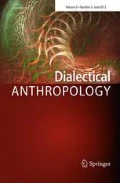Abstract
This paper explores two different views about common sense—those of Clifford Geertz and Antonio Gramsci. It examines their presuppositions, assesses their utility for archaeologists, and considers the implications of current common-sense explanations of the past. It points out that common sense is both historical. Yesterday’s common sense sometimes morphs into today’s good sense or scientific truth. Today’s common sense or scientific truth often becomes tomorrow’s false consciousness or folklore. Common sense is also relational. Groups with different positionalities in hierarchically organized societies may have widely divergent views about what is common sense. Finally, it raises the question of why particular “common sense” explanations of the present—buttressed with claims that they are rooted historically in a fixed, unchanging human nature and morality—are repeatedly resurrected by fundamentalists and conservatives in both hemispheres to justify political arguments and to reassert or impose or particular power relations.
Similar content being viewed by others
Notes
Alice Kehoe (personal communication, 2014) points out that the Scottish Common Sense philosophers, beginning with Thomas Reid’s (1710–1796) An Inquiry into the Human Mind on the Principles of Common Sense (1764). They defended the view that the five senses are innate, first principles of the human mind that underpin our conceptions of things, and that these conceptions are empirical hypotheses. Ludwig Wittgenstein (1889–1951) turned the appeal to common sense into an appeal for common language. Clifford Geertz (1973) acknowledges the influence of Wittgenstein’s ordinary language philosophy in The Interpretation of Cultures.
References
Asad, Talal. 1979. Anthropology and the analysis of ideology. Man 14(3): 607–627.
Asad, Talal. 1983. Anthropological conceptions of religion: Reflections on Geertz. Man 18(2): 237–259.
Binford, Lewis R. 1985. Human ancestors: Changing views of their behavior. Journal of Anthropological Archaeology 4(4): 292–327.
Butler, Melissa. 1991. Early liberal roots of feminism: John Locke and the attack on patriarchy. In Feminist interpretations and political theory, ed. Mary Lyndon Shanley, and Carole Pateman, 74–94. University Park: Pennsylvania State University Press.
Crehan, Kate. 2002. Gramsci, culture and anthropology. Berkeley: University of California Press.
Femia, Joseph V. 1981. Gramsci’s political thought: Hegemony, consciousness, and the revolutionary process. Oxford: Clarendon Press.
Geertz, Clifford. 1973. Thick description: toward an interpretive theory of culture. In The interpretation of culture, 3–32. New York: Basic Books.
Geertz, Clifford. 1975/1983. Common sense as a cultural system. In Local knowledge: Further essays in interpretive anthropology, 73–93. New York: Basic Books.
Gramsci, Antonio. 1971. The philosophy of praxis. In Selections from the prison notebooks, eds. Quintin Hoare and Geoffrey N. Smith, 321–377. London: Lawrence and Wishart.
Green, Marcus E., and Peter Ives. 2010. Subalternity and language: Overcoming the fragmentation of common sense. In Gramsci, language, and translation, ed. Peter Ives, and Rocco Lacorte, 289–312. Lanham: Lexington Books.
Haraway, Donna. 1978/1991a. Animal sociology and a natural economy of the body politic: A political physiology of dominance. In Simians, cyborgs, and women: The reinvention of nature, 7–20. New York: Routledge.
Haraway, Donna. 1978/1991b. The past is the contested zone: Human nature and theories of reproduction in primate studies. In Simians, cyborgs, and women: The reinvention of nature, 21–42. New York: Routledge.
Haraway, Donna. 1989. Remodeling the human way of life: Sherwood Washburn and the new physical anthropology, 1950–1980. In Primate visions: Gender, race, and nature in the world of modern sciences, 186–230. New York: Routledge.
Isaac, Glynn. 1978. The food-sharing behavior of protohuman hominids. Scientific American 238(4): 90–108.
Ives, Peter. 2004a. Gramsci’s politics of language: Engaging the Bakhtin Circle and the Frankfurt School. Toronto: University of Toronto Press.
Ives, Peter. 2004b. Language and hegemony in Gramsci. London: Pluto Press.
Ives, Peter, and Rocco Lacorte (eds.). 2010. Gramsci, language, and translation. Lanham: Lexington Books.
Lo Piparo, Franco. 1987/2010. The linguistic roots of Gramsci’s neo-Marxism. In Gramsci, language, and translation, eds. Peter Ives and Rocco Lacorte, 19–28. Lanham: Lexington Books.
Locke, John. 1690/1960. Of paternal power. In Two treatises on government, ed. Peter Laslett. Chap 15. Cambridge: Cambridge University Press.
Marx, Karl. 1852/1979. The eighteenth Brumaire of Louis Bonaparte. In Karl Marx, Frederick Engels: Collected works, vol. 11, 97–197. New York: International Publishers.
Palmer, Bryan D. 1990. Descent into discourse: The reification of language and the writing of social history. Philadelphia: Temple University Press.
Panourgiá, Neni. 2012. Interpretive anthropology. Oxford bibliographies online. http://www.oxfordbibliographies.com/view/document/obo-9780199766567/obo-780199766567-0048. Accessed 29 June 2014.
Pateman, Carole. 1991. “God hath ordained to man a helper”: Hobbes, patriarchy and conjugal right. In Feminist interpretations and political theory, ed. Mary Lyndon Shanley, and Carole Pateman, 52–73. University Park: Pennsylvania State University Press.
Rossi-Landi, Ferruccio. 1990. Marxism and ideology. Oxford: Clarendon Press.
Salamini, Leonardo. 1981. The sociology of political praxis: An introduction to Gramsci’s theory. London: Routledge and Kegan Paul.
Washburn, Sherwood L., and Virgina Avis. 1958. Evolution of human behavior. In Behavior and evolution, ed. Anne Roe, and George Gaylord Simpson, 421–436. New Haven: Yale University Press.
Washburn, Sherwood L., and David Hamburg. 1968/1972. Aggressive behavior in old world monkeys and apes. In Primate patterns, ed. Phyllis Dolhinow, 276–296. New York: Holt, Rinehart, and Winston.
Washburn, Sherwood L., and Chet S. Lancaster. 1968. The evolution of hunting. In Man, the hunter, ed. Richard B. Lee, and Irven B. DeVore, 293–303. Chicago: Aldine Publishers.
Wylie, Alison. 2011. Critical distance: Stabilising evidential claims in archaeology. Proceedings of the British Academy 171: 371–394.
Acknowledgments
This paper was prepared for a symposium, “The Archaeology of Common Sense” organized by Pamela Geller and Ann Kakaliouras for 2015 annual meeting of the Society for American Archaeology. I want to thank them for their invitation to participate in the symposium. I also want to thank Christine Gailey, Peter Gran, Alice Kehoe, and Bob Paynter for conversations over the years and especially Wendy Ashmore, once again, for sharing her insights and critical comments.
Author information
Authors and Affiliations
Corresponding author
Ethics declarations
Conflict of interest
The author declares there are no conflicts of interest.
Rights and permissions
About this article
Cite this article
Patterson, T.C. Too much common sense, not enough critical thinking!. Dialect Anthropol 40, 251–258 (2016). https://doi.org/10.1007/s10624-016-9434-5
Published:
Issue Date:
DOI: https://doi.org/10.1007/s10624-016-9434-5




